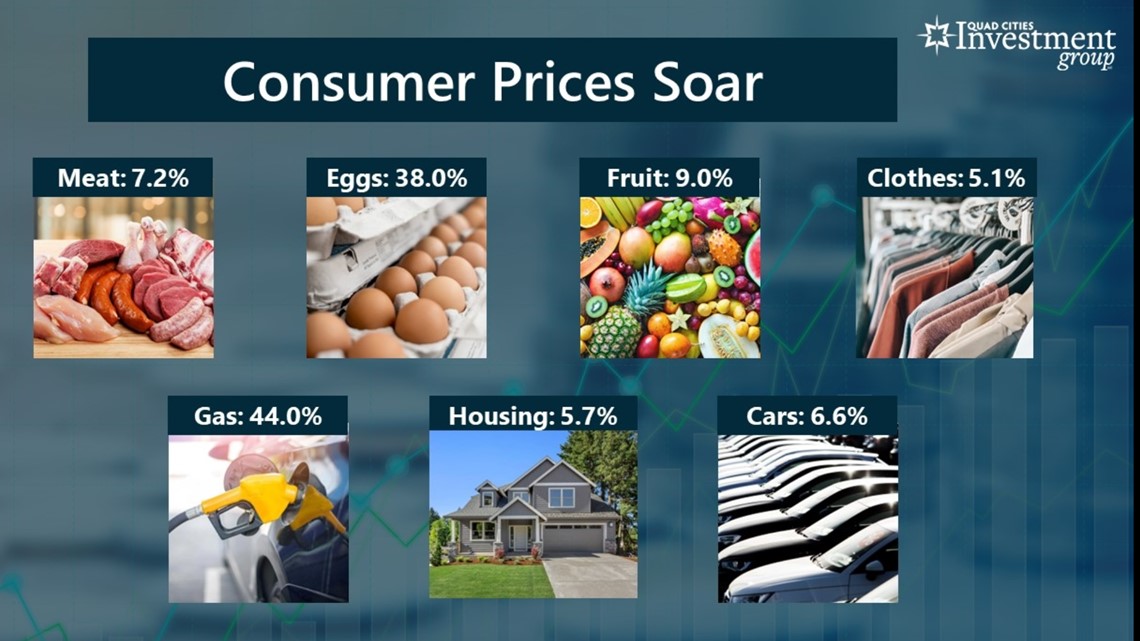MOLINE, Ill. — Even though the economy hasn’t officially been declared a recession, Americans have been feeling the sting of rising consumer prices - especially in everyday basic necessities.
News 8's David Bohlman spoke with Mark Grywacheski from Quad Cities Investment Group all about it on Monday, Aug. 22 on Good Morning Quad Cities. The full conversation is below:
Bohlman: You actually argue the greater recessionary concern is not now but actually sometime next year. Why is that?
Grywacheski: With this whole debate on the technical vs. official definition of a recession, if you’re an average American person this extremely high level of inflation feels like a recession, whether you call it one or not. Over the past 12 months, this inflation is costing the average American household an extra $5,500 in higher costs.
And for Wall Street, the bigger concern over recession is not so much now. Are we in a technical recession? Yes. But the labor market, consumer spending, manufacturing and other facets of the economy remain fairly strong.
The greater concern is 2023. The reason being is it will take about six to nine months for the impact of these interest rate hikes to filter their way through the economy. So, that puts us towards the end of this year and the first half of 2023, when Wall Street thinks the biggest economic impact will be.
What can people do now or if we do get an even greater economic pullback down the road to help them through these challenging times?


The hallmark of this inflation is very few items are being shielded from high prices and some of the highest price increases are coming from everyday basic necessities. But there are some things you can do to help make your dollar go a little bit further:
- Find the bargains where you can, especially for food and gas.
- For bigger, high-dollar purchases, it definitely helps to take some extra time to shop around for the best deal.
- In times like this, it really helps to create a budget that forces you to account for each and every expense.
- If you are forced to take money from your savings or retirement account - which many Americans are now being forced to do - keep track of what you take out. Hopefully, once this inflation passes, you can start to rebuild those accounts.
- If at all possible, avoid carrying credit card debt. I know it’s difficult, and we’re seeing credit card balances spike across the nation. As interest rates have soared, so have the interest rates on the balances you owe on your credit cards.
- If you do have to carry a credit card balance, see if you can transfer that balance to a credit card offering a promotional 0% rate or one that simply has a much lower interest rate.
But another offshoot of these rising interest rates is we’re finally starting to see rates on savings accounts, money market accounts and certificates of deposit go higher. What are your thoughts on these types of investments?
If you do have some extra cash, first, try to pay off those high-interest credit card balances you might have. Some of those credit cards charge an annual percentage rate of over 20%.
But again, this is an area that definitely pays to shop around and the internet is a great tool to search for these higher rates. You may find one bank may give you just 0.50% on a 12-month certificate of deposit but another bank down the street gives you 2% or even 2.5% on that very same deposit.
Watch "Your Money with Mark" segments Mondays during the 5 a.m. hour of Good Morning Quad Cities.
Quad Cities Investment Group is a Registered Investment Adviser. This material is solely for informational purposes. Advisory services are only offered to clients or prospective clients where Quad Cities Investment Group and its representatives are properly licensed or exempt from licensure. Past performance is no guarantee of future returns. Investing involves risk and possible loss of principal capital. No advice may be rendered by Quad Cities Investment Group unless a client service agreement is in place.
WATCH | Inflation forces Adler Theatre to increase ticket, food prices:

